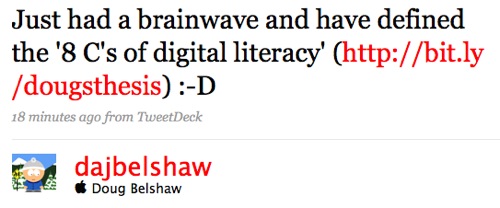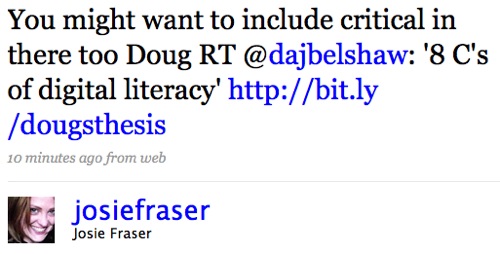Ed.D. Thesis snapshot: towards a bedrock definition of literacy.
Although I’m progressing well with my Ed.D. thesis, I do feel sometimes as though what I’m reading is adding epicycles on top of epicycles, rather than cutting (Copernicus-like) to the chase. Take, for example, definitions of digital literacy. For me to be able to deal with these systematically and critically, I need a bedrock definition of literacy upon which to base any criticism. What follows is a draft section of my thesis that aims to deal with just that. The quotation in bold towards the end is the definition of ‘literacy’ I’m thinking of using to base the rest of my thesis upon. :-p
N.B. You may want to read my previous post The 8C’s of digital literacy for context before reading this one!
Image CC BY-NC tj.blackwell @ Flickr
Claire Bélisle (in Martin, 2008:156) identifies three conceptions in the evolution of our concept of ‘literacy’. First is the model favoured by UNESCO, the functional model. This conceives of literacy as the ‘mastery of simple cognitive and practical skills.’ Most theorists in the literature – and especially those who espouse ‘new literacies’ – would see this as a definition of competence, not literacy. Thus, ‘digital competence’ could involve a basic understanding of how the internet works (e.g. hyperlinks) and having the practical skills to be able to navigate it.
The second model in the evolution of literacy cited by Bélisle is the socio-cultural practice model. This model takes as its basis that ‘the concept of literacy is only meaningful in terms of its social context and that to be literate is to have access to cultural, economic and political structures of society’ (quoted in Martin, 2008:156). This seems to make sense: that individuals have to be literate for something. A rejoinder might be that we could conceive of someone who was ‘literate’ marooned in the middle of nowhere. However, as Lemke reminds us:
Even if we are lost in the woods, with no material tools, trying to find our way or just make sense of the plants or stars, we are still engaged in making meanings with cultural tools such as language (names of flowers or constellations) or learned genres of visual images (flower drawings or star maps). We extend forms of activity that we have learned by previous social participation to our present lonely situation. (Lemke, 2002:36-7)
Within the digital sphere, the socio-cultural practice model makes sense. It deals specifically with the disenfranchisement felt by those not literate within a given domain. The model can also explain how hegemonic power can be grasped or maintained by those with access to literacy tools. A good example of the latter would be the Catholic church in Europe in the medieval period. The model is also a useful call-to-arms for those concerned about liberty and equality in society – in other words, social justice. It provides an arena for discourse about the importance of literacy in living a productive and rewarding life.
There are, however, problems with the socio-cultural practice model of literacy. It deals with literacy as an ideology more than as a practical skill. As a result, the constructive, creative and critical elements of the 8 C’s are only alluded to whilst the cultural, communicative and civic aspects are focused upon. The cognitive element is not addressed, nor is the link between literacy and confidence. The socio-cultural practice model of literacy does not, therefore, have sufficient explanatory power to be used as the bedrock for new literacies.
The final stage in the evolution of literacy, according to Bélisle, is the intellectual empowerment model. This deals with the link between new tools and new ways of thinking:
Literacy not only provides means and skills to deal with written texts and numbers within specific cultural and ideological contexts, but it brings a profound enrichment and eventually entails a transformation of human thinking capacities. This intellectual empowerment happens whenever mankind endows itself with new cognitive tools, such as writing, or with new technical instruments, such as those that digital technology has made possible. (Bélisle, 2006: 54-55, quoted in Martin, 2008:156)
This ‘meta-level’ view of literacy certainly deals with the cognitive element of the 8C’s as well as, to some extent, the critical and communicative aspects. The cultural and creative elements are inferred, but no specific mention is given to the civic, constructive and confidence aspects of literacy.
If these conceptions of literacy have indeed ‘evolved’ from one another then they are additive; they build upon one another. If this is the case, then the functional, socio-cultural practice, and intellectual empowerment models of literacy together deal with the earlier-derived 8C’s. Putting them together, we would get a definition of literacy similar to the following:
Literacy involves the mastery of simple cognitive and practical skills. To be ‘literate’ is only meaningful within a social context and involves having access to the cultural, economic and political structures of a society. In addition to providing the means and skills to deal with written texts, literacy brings about a transformation in human thinking capacities. This intellectual empowerment happens as a result of new cognitive tools (e.g. writing) or technical instruments (e.g. digital technologies).
This definition would seem to satisfy the 8C’s outlined earlier, dealing with the cultural, communicative, cognitive, civic, constructive, creative, confidence, and critical aspects of literacy.
Now that a working definition of literacy has been arrived at based on the literature, we need to test it against the four conditions outlined earlier that would make for a valid definition of digital literacy. This is because digital literacy is necessarily predicated upon a bedrock definition of ‘literacy’. To recap:
- ‘Cash value’ – it must be useful and must be able to make a difference in practice.
- Retrospective nature – it must include past (and future) instances of ‘digitally-literate practice.’
- Metaphorical nature – its position to other metaphorical terms in the literate practices arena must be explained adequately.
- Digital element – advocates must be able to explain to what the ‘digital’ part of ‘digital literacy’ pertains.
The definition of literacy has the potential to deal adequately with the ‘digital’ part of ‘digital literacy’ in that it acknowledges that changes can take place as a result of new ‘cognitive tools’ and ‘technical instruments’. Likewise, the definition can deal with both past and future instances of literate practices, as it mentions the ‘transformation in human thinking capacities’ that literacy brings about. Given that literacy is altered by the aforementioned cognitive tools and technical instruments, changes in the latter produce changes in the former. The metaphorical aspect of literacy is dealt with through its explanation that ‘the concept of literacy is only meaningful in terms of its social context’. The ‘cash value’ of the definition could be seen to be a call to action due to literacy involving gaining ‘access to cultural economic and political structures of society’ .
Bibliography
- Lemke, J.L. (2002) ‘Becoming the Village: Education Across Lives’ (in G. Wells & G. Claxton (eds.) Learning for Life in the 21st Century)
- Martin, A. (2008) ‘Digital Literacy and the “Digital Society”‘ (in Lankshear, C. & Knobel, M., Digital Literacies: Concepts, Policies and Practices)
You can read my thesis as it progresses here and view notes I’ve made on my wiki here. 😀





 ?
?